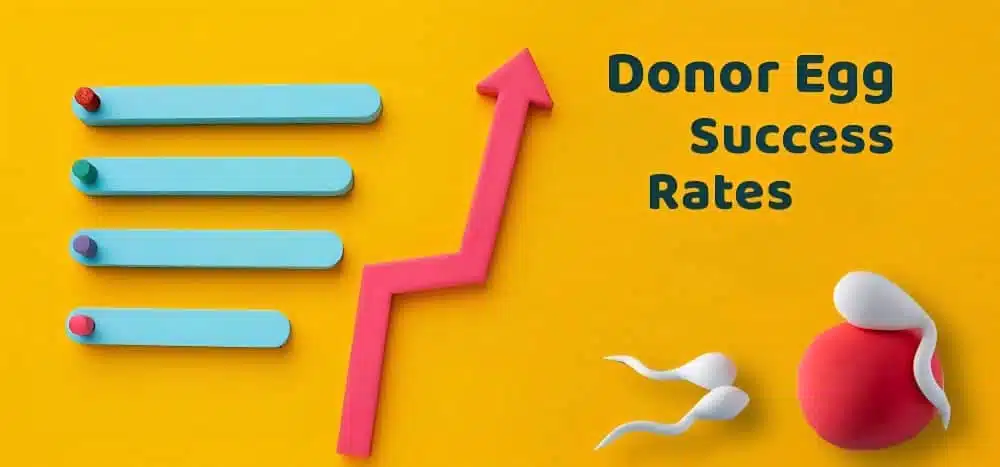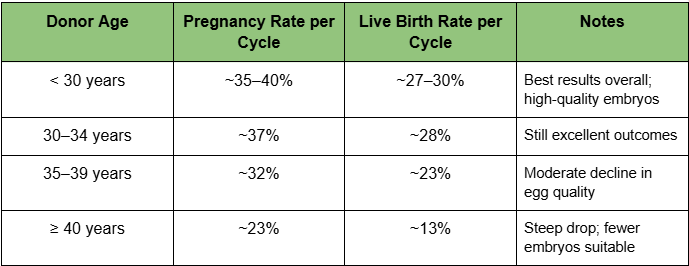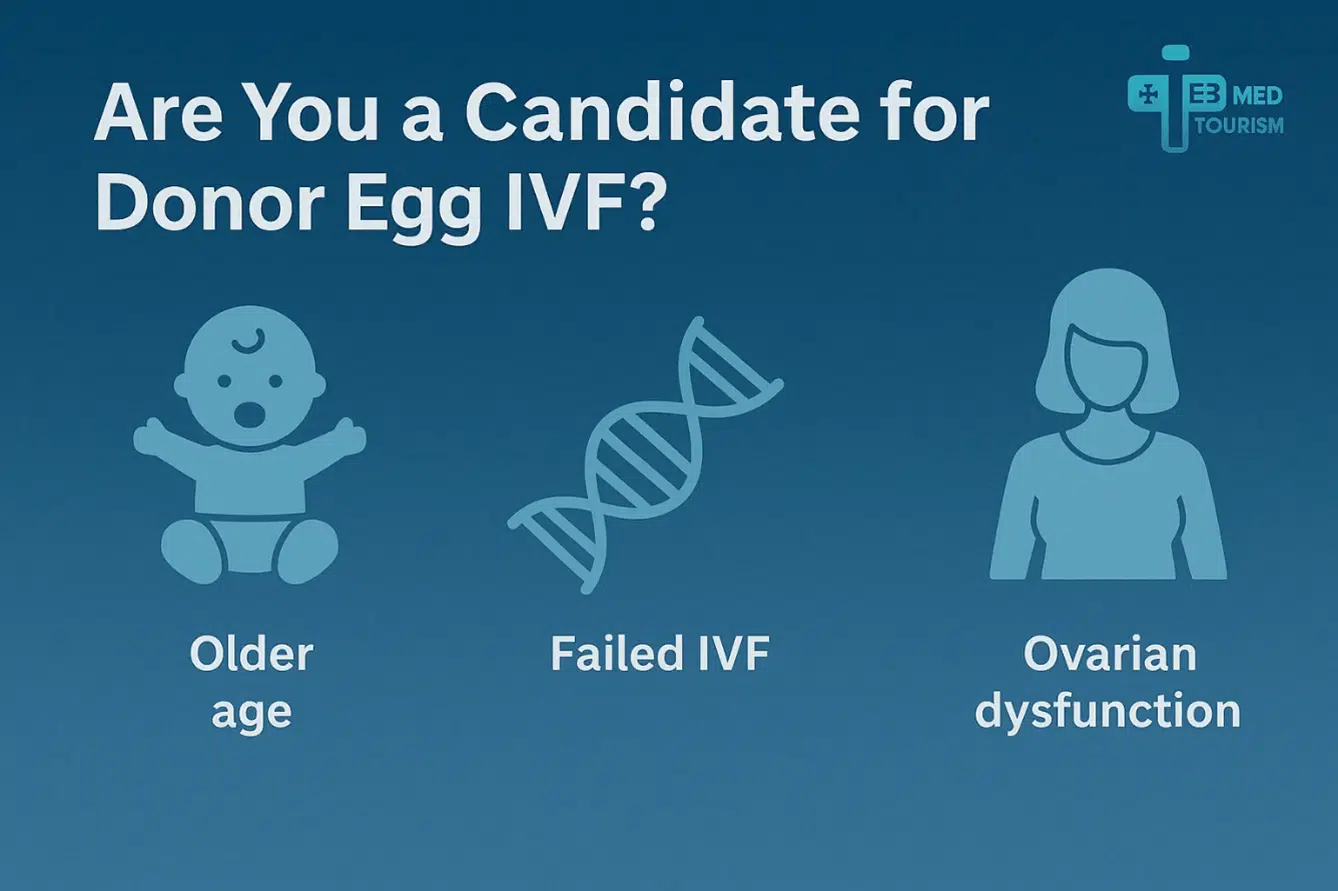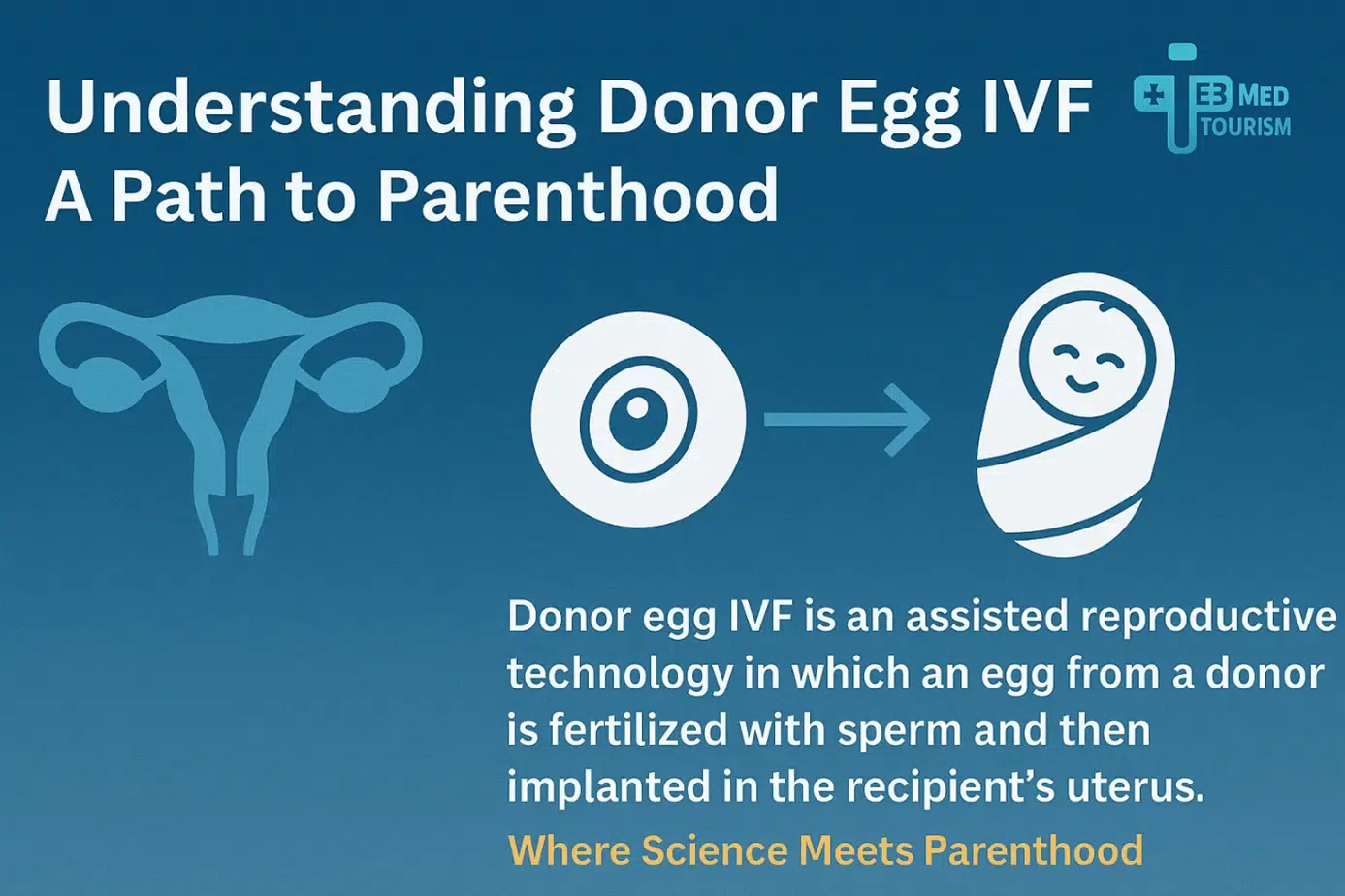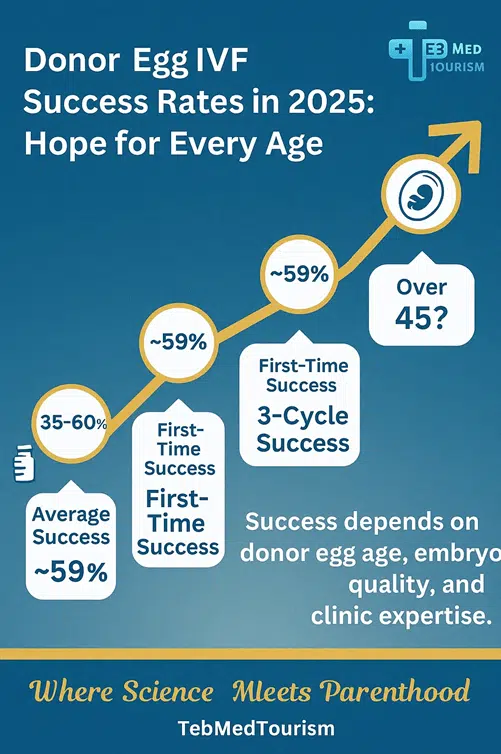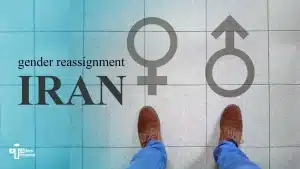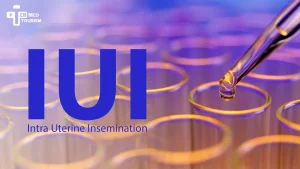What factors increase the donor Egg success rates? Despite the challenges they may face in terms of fertility, millions of couples strive for their dream of a baby. Age, health issues, or other fertility challenges can sometimes make natural fertility impossible. However, fertility treatment techniques like IVF (in vitro fertilization) offer the opportunity to become a parent.
Donated eggs have become a more common and effective alternative if a woman’s own eggs are no longer viable. As medical science and screening methods have advanced, donor egg success rates have increased over time.
In this article, we’ll talk about the cause for this increase in the use of donor eggs and also the donor egg success rates in 2026.
What is egg donation?
To calculate the donor egg success rates, we first need to know what egg donation is. The egg donation process involves a female patient (egg donor) donating her eggs to a receiver (recipient) so that the recipient can get pregnant. Performing the egg donation process correctly is effective in increasing thedonor egg success rates. Medication is required for the donor to produce several eggs in a single cycle in order to donate eggs.
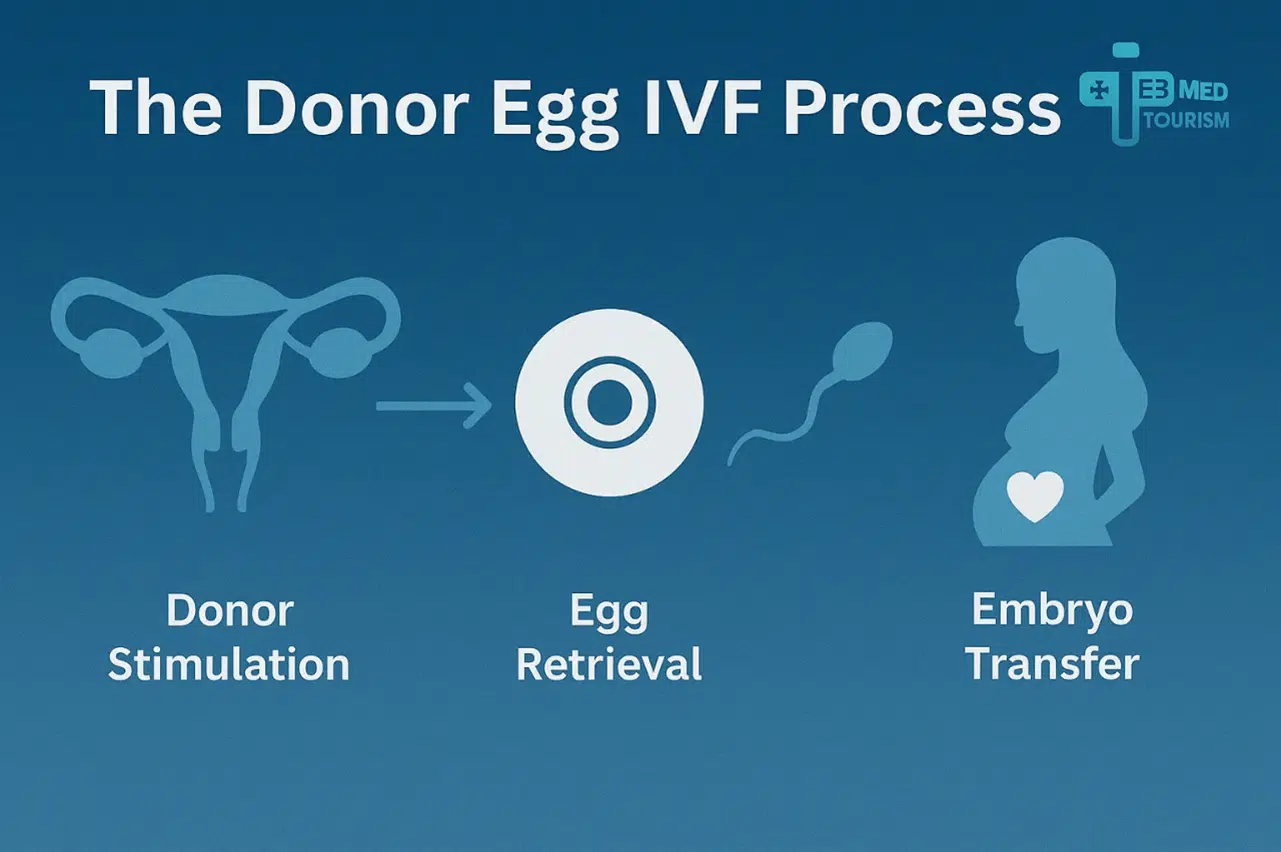
A small surgical operation is subsequently performed to remove the donor’s eggs under ultrasound guidance. To accomplish this, a needle connected to an ultrasound probe is inserted into the ovary through the vaginal tissues. The ovaries are then carefully opened to remove the eggs. Following their removal, the eggs undergo laboratory evaluation.
After that, eggs can be fertilized or frozen for later use. To enable fertilization (one sperm entering one egg), sperm from the male spouse or a sperm bank is injected into or put around each egg. In vitro fertilization (IVF) is the term for this procedure.
The fertilized egg develops into an embryo, which can either be preserved for later use or returned to the uterus — a crucial step that determines donor egg first time success for many intended parents.
How does using an egg donation increase your rate of success?
“Looking to have a baby via donor egg IVF in 2026? Here are the donor egg success rates you can expect.” This motto is on the header of the IVF+ egg donation packages of clinics and fertility treatment agencies, but how, in reality, could they satisfy their patients?
Considering this critical point, that female infertility as an important parameter may push fertility doctors to monitor it at the first step. Patient age at first, egg donor age, genetic disorders, and poor ovarian reserves are placed in successive positions that specialists should examine.
Embryo quality and embryo implanting problems are the other two factors that are affecting the donor egg success rates. In such cases, IVF facilities like IVF using a donor egg, IVF + PGD, types of surrogacy in Iran, and a good and healthy diet increase the chances of IVF success. The other options could be in front of the patients.
The solution to poor egg quality is the donor egg option via the IVF procedure, which works like a miracle, especially for women over 45.
In the egg donation process via IVF, the donor eggs are gathered from a young, healthy, and screened woman (no history of genetic issues, PCOS (Polycystic Ovary Syndrome), diabetes, infectious disease, etc.), and at the next step, will be fertilized with the sperm of the intended father.
What factors affect egg donor success rates?
“Why should you use donor eggs?” Although there are approved answers to this question that has a strict focus on age-dependent factors, there are other factors that could lead to egg donation, like genetic issues in women, surgical or cancer interruptions, and in some cases of PCOS that have several failed IVF cycles.
Genetic issues
If a woman carries a genetic disorder and wants to have a healthy baby, donor egg IVF is a good option for her. Although advanced genetic tests like PGD/PGS/PGT-A via IVF are available before the step of embryo transfer, there are some financial considerations!
You should consider this important point: the IVF procedure is expensive and time-consuming. If the first IVF cycle fails, the second IVF cycle has its own egg donation cost. Generally, it is possible you bear a lot of financial pressure. To avoid such financial difficulties, it’s better to use high-quality eggs via the donor egg option.
Cancer or surgical interruption
Receiving chemotherapy, immunotherapy, targeted therapies, and other treatments that could have a bad impression on egg quality and the egg supply will lead the patient to the donor egg IVF option.
The donor egg success rates is so helpful that many celebrities choose this option to expand their family.
Many factors affect the donor egg success rates, so it is essential to consult with a fertility specialist to determine your chances.
PCOS women with repeated failed IVF cycles
According to some research, PCOS could affect egg quality. In the Polycystic Ovarian Syndrome case, some immature eggs are detectable. So the egg patients’ quality is at a low level, and it means they aren’t appropriate to fertilize or develop for the embryo transfer stage.
Fortunately, there are harmless solutions for PCOS patients; the donor egg option via IVF is the best way for these patients to expand their families.
Environmental factors
Our bodies also change in response to shifts in the environment. Living in an industrial area exposes the body to toxins that reduce fertility.
The overall health of both the donor and recipient, plus clinic expertise, also impacts IVF success rates with donor eggs over 40 and other age groups.
You might have trouble getting pregnant or having a kid as a result of these harmful alterations to our bodies, which also affect our fertility and birth rates worldwide.
The type and quality of embryos
The type of embryos used for egg donations, especially whether they are fresh vs frozen donor eggs, and the quality of the eggs themselves have a significant impact on the birth success rate.
Donor eggs are viable for varying lengths of time and require different preservation methods depending on their type.
Physical health of prospective parents and the donor
In order to determine the couple’s current health and risks associated with any physical traits, fertility specialists undertake an entire reproductive health evaluation of them prior to beginning treatment. The doctor might identify primary ovarian insufficiency or other problems that need to be addressed, for instance.
The same is true for egg donors, who are assessed by medical professionals prior to being included in donor databases. During screening, they are also informed about the possible side effects of egg donation to ensure safety and consent.
Naturally, the probability of a successful conception, pregnancy, and delivery is influenced by the existence of any disorders. For this reason, prompt and thorough medical evaluations help control sickness and promote egg production in the most efficient and safest manner for a given patient.
The expertise of the clinic
Your clinic must be a reputable, well-established business with a track record of success in both egg donation and IVF treatment. In some regions, such as IVF in Iran, international patients travel to clinics due to their high success rates and affordability.
In order to reduce the possibility of error and, consequently, improve your chances of becoming pregnant following your IVF cycle, your doctors must be knowledgeable with the intricacies and requirements regarding the donor, the quality of the egg, and the operation itself.
How the fresh and frozen eggs are stored at the egg bank or clinic, as well as how the donor eggs were moved to the location where you receive your donor egg IVF treatment, also affects the quality of the donor eggs.
Therefore, the success of the transfer will be significantly affected by the experience of the embryologist, fertility specialists, and other medical personnel at the clinic where you are receiving treatment.
What are donor egg success rates by age?
Age is one of the most significant factors in fertility. After fresh egg recipient cycles, egg donor age had the biggest influence on pregnancy and live birth rates, according to a large population study.
After fresh egg recipient cycles, the age of the donor had the biggest influence on pregnancy and live birth rates, according to large population research published in the Journal of Human Reproduction.
Older receivers would have a higher chance of becoming pregnant and giving birth if they chose a donor under 35. However, the pregnancy and live birth rates are much lower for donors who are older than 35.
Donor egg success rates over 45
Many women wonder about the chances of twins with donor eggs or whether age impacts multiple births. Studies show that using younger donor eggs can increase twin likelihood slightly due to embryo quality.
For women over 45, donor egg success rates over 45 remain encouraging — around 35–60% per cycle, depending on the donor’s age and embryo health.
“How a woman’s age may impact the donor egg success rates?” “What are the challenges that a woman over 45 expects to have via the IVF + egg donation procedure?” “How could it be possible to be pregnant at 46 with donor eggs?” and the other questions that may occupy the minds of women who want to go through treatments using IVF and donor eggs!
Risk of pregnancy with own eggs over 45
Unfortunately, there are two main factors that play a key role in the difficulty of conceiving in women over 45:
1. Diminishing ovarian reserves by age: Choosing the right candidate increases the donor egg success rates. The term “ovarian reserves” comes from the quality and number of eggs (oocytes) that have a direct relation to age. As reported by researchers, the average number of eggs at birth is about 2 million oocytes. Around age 37, the number of oocytes reaches 25,000.
If the number and quality of eggs are less than anticipated for your age, diminished ovarian reserves are diagnosed.
In such cases, there is the most incredible opportunity; a donor egg will be proposed to the mother if the woman’s body is in good condition, and she could get pregnant and carry the baby. When a woman is incapable of carrying the embryo, a surrogacy procedure will be the next option!
2. Aneuploidy rates by age (genetic disorders): When one or more extra copies or missing chromosomes occur, an unbalanced chromosome complement will result in genetic disorders and a condition called aneuploidy. Down syndrome, known as trisomy 21, is the most famous case of aneuploidy, a widespread example due to an extra copy of chromosome 21.
The bad news is as a woman ages, the chances of having a baby with a chromosomal aneuploidy will increase. It’s because the woman’s egg age is the same as hers.
Females are born with all their eggs, so it seems natural that, over time, problems may occur in the chromosomal division of the egg. Not properly dividing will produce extra or missing chromosomes in the egg.
Based on recent research, the risk of aneuploidy follows such figures:
- If the mom’s age at delivery is 38, the risk of aneuploidy will be 1 in 102.
- If the mom’s age at delivery is 40, the risk of aneuploidy will be 1 in 66.
- If the mom’s age at delivery is 45, the risk of aneuploidy will be 1 in 21.
- If the mom’s age at delivery is 49, the risk of aneuploidy will be 1 in 8.
Most embryos with the mother’s own eggs at age 35-39 have a chance of abnormality of more than 45% and generally can’t implant in the uterus. Females over 40 will experience a worse situation, and the embryo abnormality percentage will reach 50%.
Neglecting the above factors will push you the wrong way, and you will experience failed IVF cycles! When your fertility specialist advises the egg donation process, it is intellectual that you approve of their advice.
It is better to avoid unnecessary insistence on using your egg and imposing unnecessary expenses on your family.
It is better to avoid unnecessary insistence on using your egg and imposing unnecessary expenses on your family.
Average Success Rates for Egg Donation in 2026
As women age, the success rate for IVF using their eggs decreases significantly. In 2023, donor egg IVF success rates will be a popular option for women over 45 looking to start a family. Donor egg success rates offer a much higher chance of pregnancy and birth than traditional IVF treatments with a woman’s eggs.
Neglecting the low success rate of one’s own egg will lead to receiving more medication, more injections, more IVF cycles, and more expenses and failure stories. Many women over 40 had warmed to their agency, clinic staff, and specialists, but due to insisting on going through the IVF process with their egg, they could only remember the experience of crying on the nurse’s shoulder!
But this is the time for a happy ending for sad stories! Fortunately, we have good news for women over 40 utilizing the donor egg option. The percentage of donor egg IVF success rate by TebMedTourism is more than 35%
With a success rate of around 35–60%, this treatment option helps many couples achieve their dream of having a baby. Some patients even wonder, will my donor egg baby look like me? While genetics come from the donor, environment and upbringing play strong roles in resemblance.
The reason is entirely scientific; our unique recipes are listed below:
- Using young, healthy, and screened donor egg
- Using a fresh donor egg
- Utilizing advanced genetic tests like PGD/PGS/NGS/PGT-A
- Prescription of some medications and vitamins (for successful embryo implantation)
- Recommending an IVF diet plan that exceedingly increases the IVF success rate
- Collaborating with well-skilled, well-known, conscientious doctors and specialists
TebMedTourism, located in the best country for egg donation, provides high-quality services at affordable rates and offers fair compensation packages, answering another common question—how much do egg donors make?
How many egg donation cycles are needed before success?
The success rate of egg donation is positive at most ages. Your health, the quality of donor eggs, and clinic expertise affect how many IVF cycles you may need. However, donor eggs show a moderate probability of success on the first try, with a donor egg first time success rate of about 59%.
Nevertheless, it’s possible that you’ll need to experience more cycles before becoming pregnant. After the third cycle, the likelihood of becoming pregnant is much higher (89%) than after the second (65%). In light of this, your chances of becoming pregnant rise with each subsequent IVF cycle.
Naturally, it’s important to visit several IVF clinics before beginning your treatment in order to select the one with which you are most comfortable and confident.
Conclusion
This article examines the success rate of egg donation, its challenges, and conditions. Embryo transfer using donor eggs is a common method for couples who are having trouble getting pregnant naturally, and it helps thousands of couples worldwide achieve their dream of starting a family. The high IVF success rates with donor eggs allow partners to get over their fertility problems and bring a new life into the world. Are you ready to begin your parenthood journey with TebMedTourism? Get in touch with us today to find out more!







